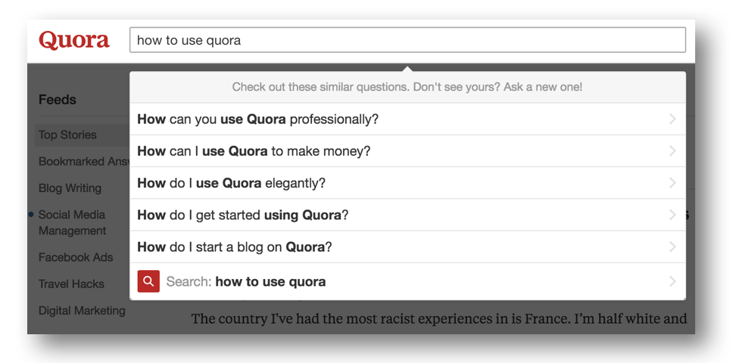Wouldn’t it be amazing if there was a free, easy to use resource that allowed you to get your most burning questions answered? Questions like... “Does Clark Kent put on a costume to become Superman, or does Superman put on a costume to become Clark Kent?”, “If unicorns exist, what are the implications?” and probably the most philosophical of questions “What is the proper way to sample cheese?”
Luckily, there IS a tool for these debate-worthy questions—and much more: Quora.
Even if you've been living under a rock, chances are you’ve heard of Quora. After all, it’s been a resource for both obscure and business related questions since 2009. I will admit I haven’t fully appreciated the brilliance of Quora for myself or for my clients.
Quora can be a tough sell for marketing managers and agencies. It’s not as obviously necessary as social media profiles or a user-friendly website. It’s less tangible than Google pay-per-click advertising and not as creatively appealing as a video project. Additionally, it can be just as time consuming as blogging and yet the content doesn’t live on your site.
Nevertheless, Quora can be a resource for long-term traffic and networking. Quora benefits both businesses and individual employees hoping to build their brand and name recognition. It’s a resource to both hone your craft and show your business acumen.
So, without further ado, let’s learn a little more about this mysterious resource where the best minds go to answer our questions.
It All Begins with the Demographics

Marketing strategy should always begin with understanding your audience. Therefore, it’s important to have some idea or concept of who is actually out there using Quora. Although it’s surprisingly difficult to find current statistics on Quora’s user base (Quora doesn’t publicly publish this data), I’ve found two potential resources: Alexa and this 2011 article from Adweek.
Obviously utilizing data from over 5 years ago is not ideal and Alexa’s analytics are an estimate, but the two resources do back up each other’s findings. Quora’s user base is predominately men in the United States and India with masters degrees. According to Adweek, the average age of a typical Quora user is 35, and they're primarily located in college towns.
Despite this demographic information, there’s one important note to remember – Quora results often come up in Google search results. It's no secret that everyone "Googles" questions, and you don’t need a Quora account to see responses. If you use Quora correctly, it can become a valuable traffic driver to your website or blog. So, let’s dig into the details.
Doesn’t It Always Come Down to an Optimized Profile?

Quora profiles are deceptively simple. They do not incorporate photo heavy profiles like Facebook, but instead the profile design reminds me of a combination of Twitter and Instagram. Each profile consists of a profile picture, headline, a feed, and credentials. Like any social profile, it’s important to fully fill out your profile. Because of the simplistic design, the copy itself is especially important. Don’t skimp on your headline and summary. And | maybe | don’t | overuse | the | vertical bar.
Be sure to highlight your social media profiles, your company/business, and the topics you’re particularly qualified to discuss. Of course, your profile should stand out and show off your expertise, but don’t be afraid to talk about things outside of your business. If you’re interested in knitting, rock climbing, or underwater basket weaving, Quora is a place where both your business interests and personal interests collide.
What you should put in your profile is unique to every industry and your qualifications. But here are a few examples I particularly like:
- IT & Technical Recruiting: Dan Holliday
- Technology & Marketing: Robert Scoble
- Entrepreneurship & Life Advice: Leonard Kim →You have to love a few well-placed emoji’s!
Quora Is All About Two Things: Questions and Answers
The question component of Quora is straightforward but shouldn’t be overlooked. Asking questions is just as important as responding to them. You wouldn’t use your business’s Facebook account to only talk about you, right?
Quora works the same way. You have to be engaging with both your responses and your questions. Wording questions so that someone would be interested in answering them is critical. Viral questions can drive as much traffic to your site as a popular response can.
As for giving answers, there are many schools of thought about how to appropriately respond to a Quora question. Some resources will tell you short and succinct answers are ideal. While others will tell you, longer answers are important.
Ultimately, I believe in treating Quora like you would treat a blog post. The answer should be exactly as long as it needs to be to answer the question. You want to provide enough detail to properly answer the question without filling the response with unnecessary fluff. Here’s my quick list of best practices for providing answers on Quora.
My 6 Quick Tips for Crafting a Masterful Quora Article
- Repurpose your blog content. Don’t miss an opportunity to re-promote the content you’ve already created! Find questions you can answer with the blogs you’ve already written. You’ll still want to write a unique answer, but a smart Quora writer will work with content from their website or blog.
- Format your Quora answer like you would a blog. If you’re an avid blogger, this won’t be a new tip. To keep people visually engaged with their writing, bloggers use bolding, italics, bullet points and other ways to break up the text and make it appear more digestible. Your Quora answers should employ the same strategy.
- Always include an image. Adding in an eye-catching image makes your content stand out from the crowd. Images are important on websites, social media, and practically all marketing strategy. Quora isn't any different!
- Use statistics and third-party resources. Again, no fluffy sentences needed. Unless the question is “If unicorns exist, what are the implications?”, you should give credit where credit is due and cite reputable sources in your answer.
- Be sure your responses aren’t too self-promotional. Your website shouldn’t be the star of the show in your Quora responses. There’s a fine line between subtly promoting yourself and outright spamming with the “me” show. Show your expertise; don't "tell" it.
- Personality is a plus – If you’re using Quora correctly, you should be featuring your real name and telling your personal story. If you can write about your first-hand experiences and show your passion for a topic, you're far more likely to rack up the upvotes.
Additional Quora Tips Curated from Around the Web
At PMG, I’ve become known for my heavily researched long-form blog content. Lucky for my editor, this post is no different – over 1,400 words and still going strong! Below I’ve pulled together a fluff-free exhaustive list of Quora tips from around the web that you can use to create successful articles...
- Quora can help with market research, blog inspiration, and competitive analysis. Like Google, you can type a topic into the search bar and see the questions people are asking about it. Quora is a great place to find topics for your blog, as well as keep an eye on competitors.

- Connect with customers. For larger companies, Quora may be a place your customers go to get questions answered about your product or service. I will admit smaller businesses may not be able to utilize this tip.
- Respond as quickly as possible. To get the credit and attention you deserve, try to answer questions as quickly as possible. The more answers there are for a particular question, the more likely you are to be lost in the crowd.
- Try weekends and late nights. It’s tempting to use Quora during work hours, especially if you’re utilizing the tool to drive more leads for your company. But ultimately, you should be on when your prospects are – after work and on the weekends. The faster you respond to questions, the more likely your answer is to be seen.
- Use the downvote judiciously. Don’t downvote an answer just because you don’t agree with it. The downvote should only be used for spam and factually inaccurate content.
- Use the “@” symbol to tag content partners. By using the “@” symbol, you can tag content partners to lend credibility to your answer. Don’t be afraid to tag your competitors, as well! Quora works best when thought leaders collaborate to help people get the information they need.
- Dig deep for unanswered questions. Upvotes aren’t everything. Look for hidden gems you can help make popular!
- Quora takes time and commitment. Quora success doesn’t happen overnight, and neither does sustained website traffic. To be successful using Quora, you have to actively answer questions with some level of frequency. Some of the resources I read recommended answering one question per day. For many small businesses, this is an overwhelming prospect. Whatever frequency you choose, stick with it.
- It’s also a powerful recruitment tool. Looking for a superstar in your industry? Take a closer look at the people answering relevant questions. You may just find your next guest blogger, freelance writer or employee!
- Pay attention to analytics. Quora doesn’t make us of analytics quite like Facebook or Twitter. However, views, upvotes, and shares help you determine if your content is resonating with readers.
A Few Additional Resources to Get You Started
- Beginner’s Guide to Quora: The Most Helpful Uses for Marketers
- 10 Tips on Using Quora for Business
- How does one best use Quora?
- How to Turn Quora into a Traffic-Driving Machine for Your Blog
Quora is a straightforward way to digitally connect with prospects. If you’re willing to invest the time in crafting quality answers and engaging with others in your industry, you’ll find opportunities to promote your blog and your expertise. And, as always, if you have any questions about Quora or any other marketing topic discussed on our blog, reach out to our team.





